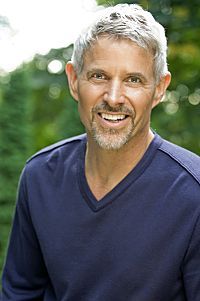Be The Doctor Who Thinks Differently
 I can summarize the most successful people I’ve ever known with one trait: the willingness to challenge mainstream ideas.
I can summarize the most successful people I’ve ever known with one trait: the willingness to challenge mainstream ideas.
An Uncommon Guest Post by Leo Babauta
This has been the key to everything good in my life too:
I changed my health and drastically reduced my carbon footprint when I stopped eating like everyone else around me and became vegetarian (and eventually vegan).
I simplified my life when I stopped believing what the majority of people believe, that buying stuff makes you happier, more secure, look better in the eyes of others, etc.
I improved my health and reduced our carbon footprint when I went car-free.
I changed my career by blogging differently than others (on simplifying rather than doing more) when I started Zen Habits.
And there are many more examples, but you get the point. This isn’t a post to brag about all of that — it’s to share what I believe is a real key to life: the willingness to think differently than most people. It means you have to be willing to question what most people do and what the majority will tell you. It means you have to have the courage to try something different. It means you have to be brave enough to stand out from the crowd and not take the safe route.
The Safe Route
Most people take the safe route, because they’re afraid of being different and failing. If you do nothing amazing but you go with the crowd, then you don’t look stupid. But then you miss out on the amazing. If you never stand out from the crowd, you will always be average. True being an average physican is no small achievement but that's not the right way of looking at it. The question should be are you living your dreams are you passionate about your day to day activites?
The people who stand out are the ones who make a mark, who innovate and discover, who learn the freedom of exploration and invention. If you stand out when you apply for residency or a job, you’ll be more likely to be noticed. If you don’t, and you play it safe, then they’ll likely ignore you. If you stand out when you start a business, people will be curious and check you out. If you’re just one of many businesses doing the same thing, why should others care about you? Why should they choose you?
And yet, most people play it safe:
Most people go to school and then college then because that’s what everyone else does. They don’t know what they really want to do, so why not take the traditional route? And that’s fine, but it’s good to look into other options. Most people get a job and stick to it because that’s the traditional way to make a living. Others might be a solo entrepreneur or start a small business and dare to create something new and live a life they’re passionate about.
Most people eat meat and dairy and eggs because that’s how they were brought up, and eating differently is weird and unthinkable. “I love my ribs too much!” But then you miss out on a whole world of healthy, delicious food, and the opportunity to change the planet and your own health.
Most people drive a car, because that’s what everyone else does — and changing it is too difficult. And yet, cars pollute and cost a lot and make us less healthy and make the streets less safe for our communities and take up most of our public spaces.
These are just some examples in my life, however the need to play it safe turns up in every part of our lives.
Learning to Think Differently
When you hear an idea that’s different than what you’re used to, pause. Instead of rejecting it outright, consider it — is there some merit? What are the arguments, the evidence? Let go of the emotions that come up, the defensiveness. Many people, when presented with ideas conterary to their belief feel they must lash out and attack. And yet, if you set aside those emotions, and look at the arguments, you might learn to think differently — and that applies to all ideas. Looking at the world, and especially your career as a physican, through these lenses can radically change your outlook.
When you are told that this is the way to do things, take a second look. Is this really the best way? Are there other possibilities? If no one has thought of them, can you? Just because an idea is different, don’t just accept it. Look at the bulk of the evidence, and learn to spot flaws in reasoning.
Test out different ideas.
Just because most people don’t do it, doesn’t mean it’s wrong. They might all be wrong, and this might be better. No better way to find out than to test it. If it’s not a good idea, drop it and move on. Learn to be proud of your ability to test things that people traditionally believe in, and not to worry so much if you stand out. In fact, learn to see standing out as good — not just to stand out, but to forge new ground, to challenge ideas, to express your individual voice rather than blending in.
____________________________
Become a writer on Uncommon Student MD: Submit a Guest Post.


 1 Uncommon Comment
1 Uncommon Comment







"I wouldn't do it twice, but I would not 'not' do it once."
- ZDoggMD